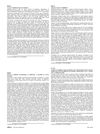 62 citations,
July 1993 in “Journal of Investigative Dermatology”
62 citations,
July 1993 in “Journal of Investigative Dermatology” Hair growth is influenced by interactions between skin layers, growth factors, and hormones, but the exact mechanisms are not fully understood.
 82 citations,
January 2000 in “Hormone Research in Paediatrics”
82 citations,
January 2000 in “Hormone Research in Paediatrics” DHEA stimulates skin oil glands and could help postmenopausal women, with potential for acne and excessive hair growth treatments.
 March 2014 in “Journal of the American Academy of Dermatology”
March 2014 in “Journal of the American Academy of Dermatology” Alopecia areata is relatively common in children, has a variable course, and shows different responses to treatment; thyroid testing is recommended for those affected.
 144 citations,
September 2006 in “Clinics in Dermatology”
144 citations,
September 2006 in “Clinics in Dermatology” Lupus affects the body and skin, causing joint pain and skin issues that can be treated with steroids and antimalarial drugs.
 11 citations,
January 2022 in “Journal der Deutschen Dermatologischen Gesellschaft”
11 citations,
January 2022 in “Journal der Deutschen Dermatologischen Gesellschaft” Alopecia areata is a chronic condition causing hair loss, with new treatments targeting the immune system showing promise.
 7 citations,
May 2016 in “SpringerPlus”
7 citations,
May 2016 in “SpringerPlus” Some breast cancer patients on hormone therapy experience hair loss, and treatments like certain topical inhibitors and supplements may help without harming their cancer prognosis.
 25 citations,
June 2020 in “Dermatology practical & conceptual”
25 citations,
June 2020 in “Dermatology practical & conceptual” Scalp cooling can help prevent hair loss from chemotherapy, but treatment should be tailored to the individual and more research is needed.
 30 citations,
December 2001 in “Journal of The European Academy of Dermatology and Venereology”
30 citations,
December 2001 in “Journal of The European Academy of Dermatology and Venereology” Hormonal therapy is a good option for women with severe acne, especially when there's a chance of hormone imbalance.
 2 citations,
January 2023 in “International journal of biological sciences”
2 citations,
January 2023 in “International journal of biological sciences” Gray hair can potentially be reversed, leading to new treatments.
 11 citations,
October 2021 in “Stem Cell Research & Therapy”
11 citations,
October 2021 in “Stem Cell Research & Therapy” Hair follicle stem cells reduced hair loss and inflammation in mice with a condition similar to human alopecia.
April 2021 in “Aktuelle Dermatologie” Frontal Fibrosing Alopecia is a type of hair loss that mainly affects postmenopausal women, has unclear causes, and lacks evidence-based treatments.
 4 citations,
January 2023 in “Skin health and disease”
4 citations,
January 2023 in “Skin health and disease” Blocking Janus kinase 1 helps stop inflammation and regrow hair, making it a good treatment for hair loss from alopecia areata.
 April 2023 in “Journal of Investigative Dermatology”
April 2023 in “Journal of Investigative Dermatology” Two new IRAK4-inhibitors effectively reduced skin inflammation and immune response markers in healthy volunteers.
18 citations,
August 2019 in “Clinical breast cancer” Local hormonal treatment for vulvovaginal atrophy is likely safe for women with estrogen receptor-positive breast cancer on aromatase inhibitors.
 10 citations,
February 2015 in “Clinics in Dermatology”
10 citations,
February 2015 in “Clinics in Dermatology” The document concludes that changes in eyelashes and eyelid skin can indicate various local and systemic diseases.
 April 2023 in “The journal of investigative dermatology/Journal of investigative dermatology”
April 2023 in “The journal of investigative dermatology/Journal of investigative dermatology” Phototherapy helps some patients with alopecia areata regrow hair, especially those with hair at treatment start and less severe forms of the condition.
 October 2020 in “Revista médica sinergía/Revista médica sinergia”
October 2020 in “Revista médica sinergía/Revista médica sinergia” Alopecia areata is a complex condition causing hair loss, linked to genetics and immune system issues, and may be related to other autoimmune diseases; treatments vary in effectiveness.
4 citations,
July 1983 in “Journal of steroid biochemistry/Journal of Steroid Biochemistry” Certain hormones can reduce skin oil and hair growth, potentially helping treat acne and excessive hair in women.
 124 citations,
October 2019 in “Frontiers in Immunology”
124 citations,
October 2019 in “Frontiers in Immunology” Janus kinase inhibitors are promising treatments for autoimmune skin diseases like eczema and psoriasis.
 10 citations,
November 2018 in “Nature Biotechnology”
10 citations,
November 2018 in “Nature Biotechnology” Drugmakers are optimistic about targeting the Wnt pathway for new treatments despite past challenges.
 1 citations,
March 2011 in “Informa Healthcare eBooks”
1 citations,
March 2011 in “Informa Healthcare eBooks” Hormonal therapy is effective for treating acne in adult women, especially with signs of high androgen levels.
 October 2018 in “Springer eBooks”
October 2018 in “Springer eBooks” The document concludes that various topical medications are effective for skin conditions but often cause skin irritation as a side effect.
 17 citations,
December 2004 in “Bioorganic & Medicinal Chemistry Letters”
17 citations,
December 2004 in “Bioorganic & Medicinal Chemistry Letters” Scientists found new, better-working inhibitors for a hormone-related enzyme.
 1 citations,
January 2003 in “Expert Opinion on Therapeutic Patents”
1 citations,
January 2003 in “Expert Opinion on Therapeutic Patents” Steroid sulfatase inhibitors could potentially treat hormone-related disorders like certain cancers, hair loss, acne, and improve cognitive dysfunction.
 25 citations,
May 2003 in “Expert Opinion on Therapeutic Patents”
25 citations,
May 2003 in “Expert Opinion on Therapeutic Patents” Steroid Sulfatase inhibitors show promise in treating hormone-dependent disorders like cancers, hair loss, and acne, with 667COUMATE being a potential candidate for breast cancer treatment trials.
52 citations,
September 2014 in “Nature medicine” JAK inhibitors might help treat alopecia areata.
 46 citations,
May 2012 in “Molecular and Cellular Endocrinology”
46 citations,
May 2012 in “Molecular and Cellular Endocrinology” Human skin produces sex hormones like estrogen and testosterone, influenced by ARO and StAR, which may affect skin elasticity and hair growth.
 March 2018 in “Suez Canal University Medical Journal”
March 2018 in “Suez Canal University Medical Journal” New drugs targeting the JAK-STAT pathway show promise for treating inflammatory skin diseases.
 47 citations,
August 2000 in “Endocrine Reviews”
47 citations,
August 2000 in “Endocrine Reviews” The document concludes that more research is needed to understand excessive hair growth in women with normal hormone levels and regular ovulation.
June 2024 in “Dermatopathology” A rare type of skin cancer on the scalp can be mistaken for hair loss, causing delayed diagnosis and severe damage.

























